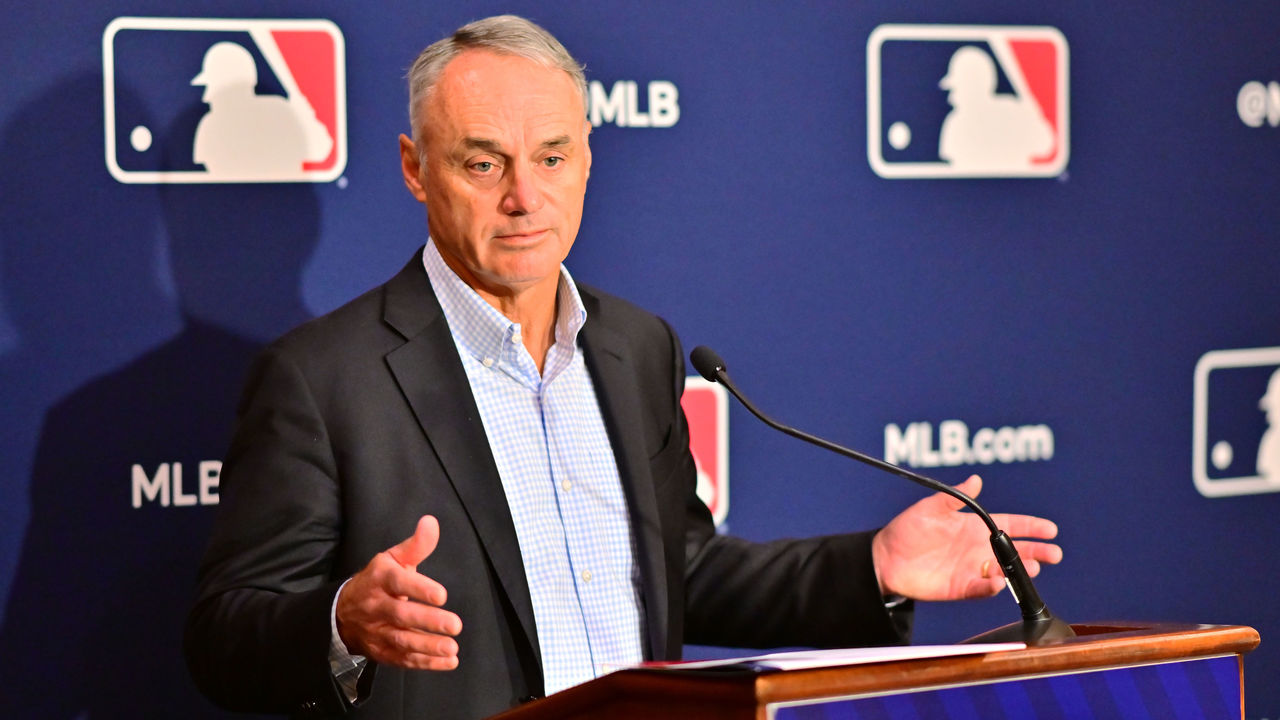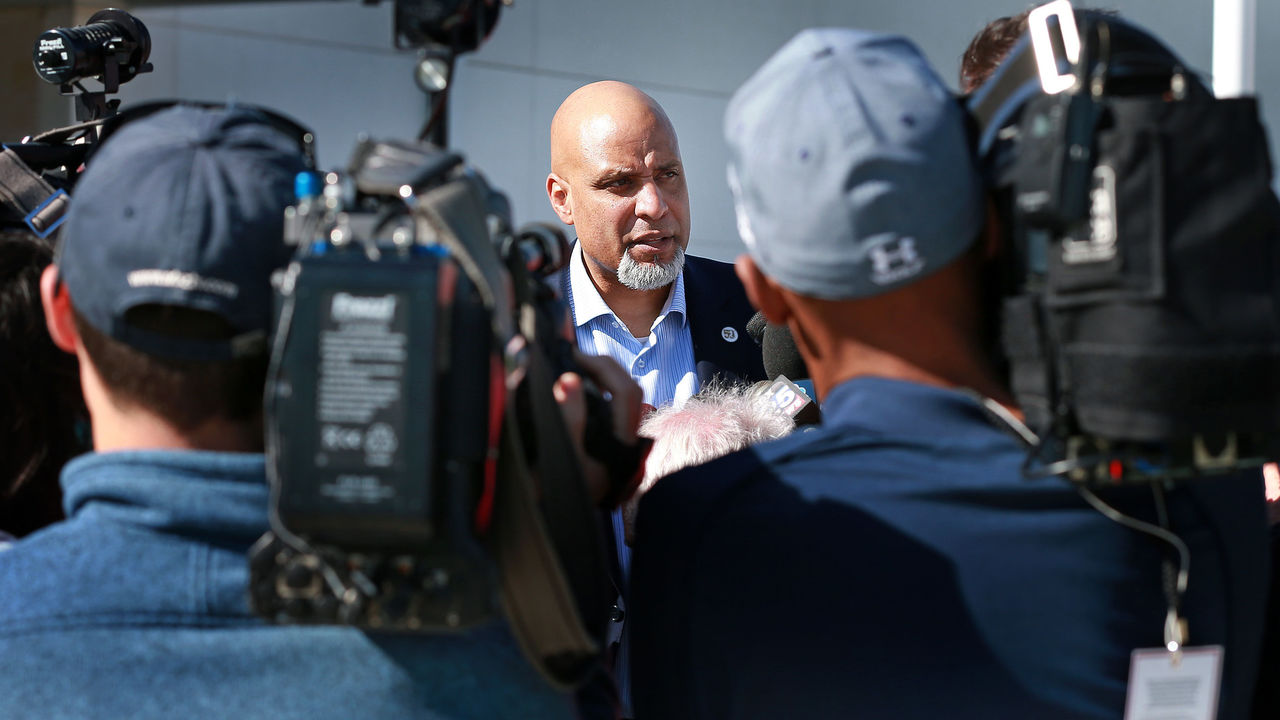Momentum mirage dissolved by reality as baseball enters disaster phase
After so little progress in the first three months of this baseball lockout, it seemed both parties were miraculously nearing a deal Monday night.
The clock was approaching Major League Baseball's self-imposed midnight deadline to avoid a loss of regular-season games, but momentum appeared to be building as the two parties crisscrossed the parking lot in Jupiter, Florida, a dozen times to hammer out the details. Talks went on for some 15 hours. Reporters such as USA Today's Bob Nightengale began to report details on breakthroughs ranging from collective balance tax penalties to the size of an expanded playoff.
Nightengale even slipped into a kind of baseball poetry at midnight, adding exuberance to the mood on Twitter.
It is now midnight and no one is moving as the two sides moving ever so closer
— Bob Nightengale (@BNightengale) March 1, 2022
At 12:46 a.m, MLB Network's Jon Heyman added further optimism.
Current plan is to stay in the stadium and keep talking until a deal is done. Determination to finish this exists.
— Jon Heyman (@JonHeyman) March 1, 2022
The two sides met until 2:30 a.m. ET.
The players' camp was eerily quiet. Few leaks were emerging from that side of the table. Still, many fans and reporters were generally hopeful a deal might be close. But when we awoke Tuesday, on the 90th day of the lockout, the mood had changed.
That morning, an MLBPA source told theScore the two sides remained far apart on a number of issues, including the competitive balance tax thresholds.
Later in the day, an MLB player familiar with details of the talks said the two sides were "never even close in the slightest."
By Tuesday afternoon, the MLBPA rejected what was described by reporters as MLB's "last and best" offer about a half-hour before the new 5 p.m. cutoff.
When that deadline passed, MLB commissioner Rob Manfred emerged to tell the collected reporters he was canceling the first two series of the regular season, something Manfred had described as a "disastrous" outcome a few weeks earlier. They are the first games lost to a work stoppage since 1995.
It's unclear when exactly the two sides will return to the table.
So what happened to that Monday night momentum? Did it even exist?
If some progress was perhaps made on tax penalties and the size of the playoff field, scores of issues still needed to be addressed Tuesday. Asked why MLB waited so long to get serious - including a 43-day break after imposing the lockout on Dec. 2 - Manfred dodged the question and pointed instead to the last nine days of meetings.
Sources on the players' side contend that much of the messaging offered to reporters Monday night might have been strategically placed by MLB. San Francisco Giants pitcher Alex Wood tweeted: "If there's no deal the optimism from MLB was a PR illusion to make it look like they tried."
FWIW MLB has pumped to the media last night & today that there’s momentum toward a deal. Now saying the players' tone has changed. So if a deal isn’t done today it’s our fault. This isn’t a coincidence. We’ve had the same tone all along. We just want a fair deal/to play ball.
— Alex Wood (@Awood45) March 1, 2022
A prominent NHL agent, Allan Walsh, said MLB might have been trying to apply a common sort of "psychological pressure" in a labor negotiation.
Creating the perception a deal is close when it’s not is a form of intense psychological pressure on players to break their will. It was straight out of Bettman’s playbook in 2005 when he canceled the NHL season and then for a brief moment opened the door to uncancelling it. https://t.co/CrpimLiaYb
— Allan Walsh (@walsha) March 1, 2022
If MLB pulled a page from that playbook, it may have worked only on reporters and a hopeful fan base.
Toronto Blue Jays pitcher Ross Stripling, who is the team's union rep and a certified financial advisor, told Sportsnet's Shi Davidi and Ben Nicholson-Smith that MLB tried to sneak in new items in the late hours.
"It got to be like 12:30 and the fine print of their CBT proposal was stuff we had never seen before," Stripling said. "They were trying to sneak things through us; it was like they think we're dumb baseball players and we get sleepy after midnight or something. It's like that stupid football quote, they are who we thought they were. They did exactly what we thought they would do. They pushed us to a deadline that they imposed, and then they tried to sneak some shit past us at that deadline and we were ready for it. We've been ready for five years. And then they tried to flip it on us today in PR, saying that we've changed our tone and tried to make it look like it was our fault. That never happened."
theScore spoke to several sources from the players' side Tuesday morning who had issues with the reported details that had emerged from negotiations. They felt a deal that included those parameters wouldn't represent a big enough change to compensation for pre-arbitration players. They wondered why the MLBPA seemed to be rushing into a deal after digging in all winter.
As it turned out, no deal was close, according to the MLBPA.
While the dollar differences might not seem big enough to warrant losing part of the schedule, the rhetoric Tuesday made it feel like the camps are miles apart.
Manfred claimed Tuesday that the "last five years were difficult for the league from a revenue perspective," in large part because of COVID-19. In reality, MLB earned nearly $43 billion in revenue during that time and franchise values continued to appreciate.

Manfred said the sport had a "payroll disparity" problem that needed to be addressed, but it's not clear how the MLB proposal would force low-budget teams like the Pittsburgh Pirates to spend more to make a better on-field product.
The MLBPA followed Manfred with its own news conference. Executive director Tony Clark said the game has been "damaged," including by the way "players have been commoditized."
What Clark hit on is that the data age may have broken the sport; not so much because of launch angles and defensive shifts - shifts, which MLB tried to ban with a last-minute proposal addendum - but because teams now understand aging models, platoon splits, and times-through-the-order performance for pitchers.
The player-evaluation model has changed dramatically in the span of two CBA cycles. Teams acted faster than the players in gaming the CBA. An analytics- and development-savvy team like the Tampa Bay Rays can put a competitive product on the field without ever spending more than $103 million in any of the last 10 seasons.
MLB teams have been pinching players' careers on the front end by delaying the arrival of top prospects to manipulate their service time and shortening careers on the back end by eschewing free agents in favor of cost-controlled players from their systems. Meanwhile, free-agency eligibility (six full years of service time) hasn't changed since 1976, and arbitration eligibility has changed little since 1991.

So now what?
One veteran of MLBPA labor fights said players "can't win a major victory by walking across a parking lot." Rather, to win major victories, they'll have to be comfortable with being uncomfortable, he said.
"There's no such thing as resolve being tested on March 1st," he said.
Resolve requires sitting through missed games, he said. Empty stadiums don't generate revenue for the owners. Missed paychecks will test the players' resolve.
The union has been telling players for more than a year to prepare financially. It has some cash reserves to ease the pain, but it's not the same as a major-league paycheck.
So do the two camps dig in further or find a midpoint quickly in order to lose as few games as possible?
"Either party could try to alter proposals (from Tuesday) but not sure how likely," one source familiar with MLB labor process said. "It will take on a life of its own now that both sides take an economic hit."
Travis Sawchik is theScore's senior baseball writer.